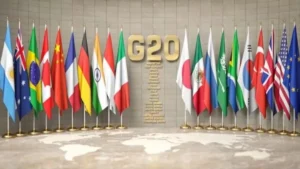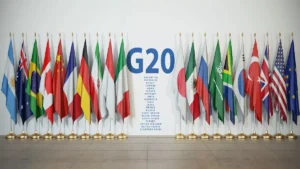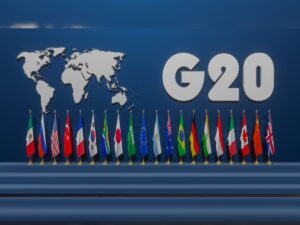Introduction:
In an increasingly interconnected world, international collaboration and dialogue are pivotal to addressing global challenges. The G20 summit stands as a prime example of such collaboration, where leaders from the world’s largest economies gather to discuss and coordinate policies on a wide range of issues. This article delves into the important factors surrounding the G20, its history, key functions, focus areas, and its role in shaping global economic and political dynamics.
The Genesis of G20:
The G20, short for “Group of Twenty,” emerged in the wake of the 1997 Asian financial crisis as a response to the limitations of the existing G7 (Group of Seven) forum. The G7 included the world’s seven largest advanced economies, but the crisis exposed the need for a broader representation of countries to tackle global economic issues. As a result, the G20 was formed, comprising 19 individual countries plus the European Union, collectively representing a diverse range of economies, cultures, and interests.
The G20 was established in 1999 to address several world economic crises. Since 2008, it meets at least once a year, with each member’s head of government or state, finance minister, or foreign minister, and other high-ranking officials. The European Union is represented by the European Commission and the European Central Bank. Some permanent guests such as other countries, international organizations and non-governmental organizations are invited to participate in the summit.
At its 2009 summit, the G20 declared itself the primary venue for international economic and financial cooperation.

G20 members:
By 2022, the group has 20 members—Argentina, Australia, Brazil, Canada, China, France, Germany, India, Indonesia, Italy, South Korea, Japan, Mexico, Russia, Saudi Arabia, South Africa, Turkey, the United Kingdom, the United United States, Spain, United Nations, World Bank, African Union, ASEAN and European UnionAlso, permanent guests are invited
Key Functions and Objectives:
Economic Policy Coordination: The primary objective of the G20 is to foster international economic cooperation. Leaders discuss policies aimed at achieving balanced and sustainable economic growth, reducing financial vulnerabilities, and preventing future crises.
Financial Regulation:
The G20 plays a significant role in shaping international financial regulations to ensure the stability of the global financial system. Discussions cover areas such as banking reforms, taxation, anti-money laundering measures, and more.
Trade and Investment:
Facilitating global trade and investment is another crucial aspect of the G20’s agenda. Leaders address trade barriers, protectionism, and efforts to promote open markets and fair trade practices.
Development:
The G20 recognizes the importance of inclusive growth and poverty reduction. Development initiatives are discussed to support emerging economies and address issues like infrastructure, health, education, and gender equality.

Climate Change and Sustainability:
In recent years, the G20 has increasingly focused on addressing environmental challenges, including climate change. Discussions cover strategies to mitigate climate impacts, transition to renewable energy sources, and advance sustainable development.
Global Health and Pandemic Response:
The COVID-19 pandemic underscored the need for international collaboration in responding to health crises. The G20 plays a role in coordinating pandemic response efforts, ensuring access to vaccines, and strengthening global healthcare systems.
Annual Summits and Host Countries:
The G20 summit is a platform for leaders to engage in face-to-face discussions and negotiations. The summit is hosted annually, and each year, a member country assumes the presidency, setting the agenda and hosting the event. Summits are typically attended by heads of state, finance ministers, central bank governors, and other high-ranking officials.
Focus Areas and Achievements:
Global Financial Crisis (2008-2009): One of the most significant moments in the G20’s history was its coordinated response to the global financial crisis. In 2008, leaders formulated a series of measures to stabilize financial markets, stimulate economic growth, and prevent a deeper recession.

Climate Agreements:
The G20 has been instrumental in facilitating discussions leading up to global climate agreements. While there have been differences among member countries, the G20 has played a role in shaping the international climate agenda.
Space Technology: Historical Evolution of Space Technology
Trade and Tariffs:
The G20 has addressed trade tensions and tariff disputes that can disrupt global commerce. While consensus on trade-related issues can be challenging, the forum provides a platform for dialogue and negotiation.
What is the G20, of which India becomes president later this year?


















